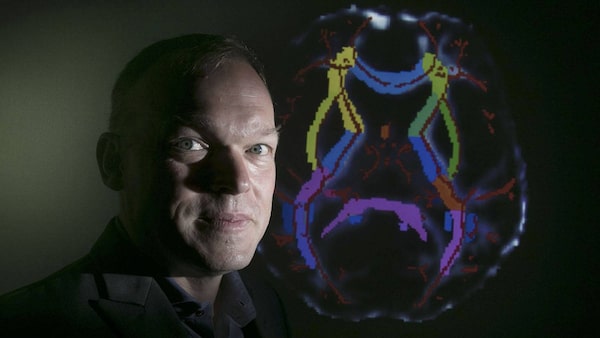
Sean Hill, the inaugural director of the Krembil Centre for Neuroinformatics at CAMH in Toronto, poses along with an image of a brain scan in his Toronto office on August 30, 2017.Glenn Lowson/The Globe and Mail
When it comes to understanding the underlying causes of mental illness, scientists are "drowning in data."
That is how Catherine Zahn, the leader of Canada's largest mental-health and addictions hospital, describes the sea of electronic medical records, brain scans and genetic-test results in which today's brain researchers are swimming.
They have access to a flood of data from an untold number of patients, but they are only now harnessing the power of super computers and artificial intelligence to make sense of it in a way that could one day help people with schizophrenia or bipolar disorder or depression.
Dr. Zahn, the president of the Centre for Addiction and Mental Health (CAMH) in Toronto, is hoping that a $15-million donation to be unveiled on Thursday will move this burgeoning area of mental-health research beyond the computer and into the clinic.
The latest gift from the family of mutual-fund investor Robert Krembil will create a new research hub at CAMH called the Krembil Centre for Neuroinformatics.
Neuroinformatics is a field that combines data science with neuroscience.
The fledgling centre has already lured Sean Hill, a world-renowned computational neuroscientist, away from Switzerland to be its inaugural director. CAMH intends to recruit at least a dozen more researchers to a centre that will be staffed by a team of about 35 scientists and technicians.
"We have this sea of data. We have the computational capability … [but] we don't have enough scientists," Dr. Zahn said. "That's basically what the Krembil gift is offering us – the opportunity to recruit leaders like Sean Hill."
Before moving to Toronto last month, Dr. Hill was the co-director of Blue Brain, a Swiss project that is creating digital simulations of parts of the rat brain, and which eventually hopes to do the same with the human brain. Computer models of the brain are designed to help scientists better understand how the extraordinarily complex organ works.
Raised on an organic farm in rural Maine, Dr. Hill's interest in computing began when a teacher let him and his brother take the school's lone computer, a TRS-80, home during holidays. The pair spent hours coding in a cold room warmed by a little heater.
"In the depths of winter, I started to get really fascinated with computers," Dr. Hill said. "That interest led to thinking, well, what does it take to actually build an intelligent machine?"
The CAMH job appealed to Dr. Hill because it offered him the opportunity to connect his life-long interest in super-smart machines to the real world of a large mental-health hospital.
"I spent 10 years doing those simulations with Blue Brain," he said in an interview from CAMH's College Street site, which will be the home of the new neuroinformatics lab. "I feel it's very important to see how, in this next chapter of my career, we can make sure that that sort of stuff starts to have an impact in the clinic. It's time. It's early, but it's still time."
Dr. Zahn pointed to schizophrenia research as one area that could benefit from having artificial intelligence programs search for patterns in the health records and brain scans of a huge number of patients.
"We know that in people with schizophrenia there have been literally dozens of genes that are associated with it, that seem to cluster with it," she said. "What we don't know is which one is causative [and] which ones are just along for the ride. To understand the truth of that, you need to be putting together literally millions of points of data."
CAMH already has a sophisticated computer platform that allows for the consistent and accurate gathering, analyzing and sharing of patient data collected from research studies on brain disorders. It is the first place in Ontario to have adopted the full architecture of Brain-CODE, an informatics platform created by the Ontario Brain Institute, a provincially funded neuroscience research centre. (Dr. Hill is a long-time adviser to the Brain-CODE project.)
Tom Mikkelsen, the president and scientific director of the Ontario Brain Institute, lauded CAMH for "leading the charge," with a neuroinformatics program that should persuade more data scientists to apply their skills to making people healthier in body and mind.
"The idea is to attract talent into the health-care space because of the huge unmet need and the huge potential for impact," Dr. Mikkelsen said.
 Kelly Grant
Kelly Grant